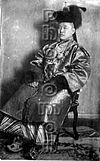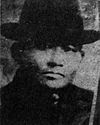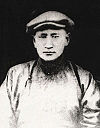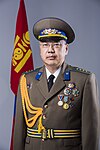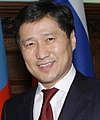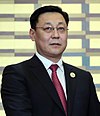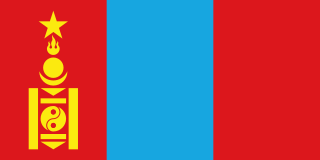
The Mongolian People's Republic was a socialist state that existed from 1924 to 1992, located in the historical region of Outer Mongolia under the Qing dynasty. It was officially recognized by the Nationalist government as independent from the Republic of China in 1946. Until 1990, it was a one-party state ruled by the Mongolian People's Revolutionary Party, and maintained close political and economic ties with the Soviet Union, as part of the Eastern Bloc.

The prime minister of Croatia, officially the president of the government of the Republic of Croatia, is Croatia's head of government, and is de facto the most powerful and influential state officeholder in the Croatian system of government. Following the first-time establishment of the office in 1945, the 1990–2000 semi-presidential period is the only exception where the president of Croatia held de facto executive authority. In the formal Croatian order of precedence, however, the position of prime minister is the third highest state office, after the president of the Republic and the speaker of the Parliament.

The chairman of the government of the Russian Federation, also informally known as the prime minister, is the head of government of Russia and the second highest ranking political office in Russia. Although the post dates back to 1905, its current form was established on 12 December 1993 following the introduction of a new constitution.

The president of Ethiopia is the head of state of Ethiopia. The position is largely ceremonial with executive power vested in the Council of Ministers chaired by the prime minister. The current president is Sahle-Work Zewde, who took office on 25 October 2018. Presidents are elected by the Federal Parliamentary Assembly for six years.
These are lists of political office-holders in East Germany. The political leadership of East Germany was distributed between several offices. However, until the Volkskammer removed a section in the GDR's constitution guaranteeing their monopoly on political power on 1 December 1989, the Socialist Unity Party of Germany (SED) held ultimate power and authority over state and government. Thus, the head of the SED's Politburo of the Central Committee was the de facto leader of the country.

The prime minister of Mongolia is the head of government of Mongolia and heads the Mongolian cabinet. The prime minister is appointed by the Mongolian parliament or the State Great Khural, and can be removed by the parliament with a vote of no confidence.
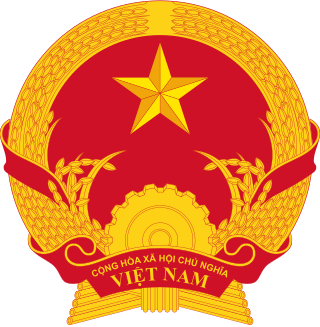
The president of the Socialist Republic of Vietnam is the head of state of Vietnam, elected by the National Assembly of Vietnam from delegates of the National Assembly. Since Vietnam is a single-party state, the president is generally considered to hold the second highest position in the political system, practically after the general secretary of the Communist Party of Vietnam. In addition, the president appoints the head of government, the prime minister. As head of state, the President represents Vietnam both domestically and internationally, and maintains the regular and coordinated operation and stability of the national government and safeguards the independence and territorial integrity of the country.

The prime minister of Armenia is the head of government and most senior minister within the Armenian government, and is required by the constitution to "determine the main directions of policy of the Government, manage the activities of the Government and coordinate the work of the members of the Government." Also, according to the constitution, the prime minister heads the Security Council, which prescribes the main directions of the country's defense policy; thus, the prime minister is effectively the commander-in-chief of the Armed Forces of Armenia. Nikol Pashinyan is the current prime minister. He took the office on 8 May 2018 following the resignation of Serzh Sargsyan.
An indirect election or hierarchical voting, is an election in which voters do not choose directly among candidates or parties for an office, but elect people who in turn choose candidates or parties. It is one of the oldest forms of elections and is used by many countries for heads of state, cabinets, heads of government, and/or upper houses. It is also used for some supranational legislatures.

The prime minister of Afghanistan, officially the prime minister of the Islamic Emirate of Afghanistan, is the head of government of Afghanistan.

Anandyn Amar was the head of state of the Mongolian People’s Republic from 1932 to 1936 and twice served as prime minister from 1928–1930 and again from 1936–1939. A widely respected politician, Amar was known for his eloquent defense of Mongolian independence in the face of increasing Soviet domination. Despite this, he proved powerless in preventing Minister of Interior Khorloogiin Choibalsan and the Soviet NKVD from carrying out mass purges of nearly 30,000 Mongolians during his second term as prime minister between 1937 and 1939. Amar's popularity ultimately led to his purge by the pro-Soviet Choibalsan who had him charged with counterrevolution in 1939. Amar was sent to Moscow for trial and executed on July 10, 1941.

Balingiin Tserendorj titles Khicheengui Said (Хичээнгүй Сайд, Diligent/Earnest Minister); Khicheengui Gün, was a prominent Mongolian political figure of the early 20th century who served as the first Prime Minister of the People's Republic of Mongolia from 1924 until his death in 1928. Between 1913 and 1924 he held several high-ranking positions within a succession of Mongolian governments including; the Bogd Khaanate (1911–1924), the Chinese occupation (1919-1921), and the puppet regime under Roman Ungern von Sternberg (1921).

